Gender Equity Bulletin, Issue 12, June 2018 - Focus on Women in Lebanese Elections

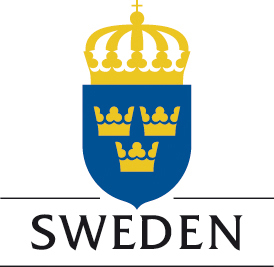

Issue 12, June 2018 - العدد رقم ١٢، حزيران ٢٠١٨
About the newsletter
Why the Gender Equity Newsletter?
This newsletter aims to connect gender actors and practitioners in Lebanon through the exchange of expertise, in an attempt to create a space for better collaboration, networking, and equal access to knowledge, research, and information. Issues cover the work of actors, their activities, and projects, in addition to recommending relevant resources and tools, as well as information and statistics relevant to gender work in Lebanon.
The gender equity newsletter is a part of the Gender Equity Network, a project by Lebanon Support in partnership with Diakonia.
The Gender Equity Network is an online collaborative platform. It is part of Lebanon Support’s Civil Society Knowledge Centre (CSKC) and brings together civil society organisations, researchers, practitioners, and experts to enhance local and national capacities, improve access to knowledge and its development, and provide evidence-based research, information, and literature on gender issues and concerns.
لماذا نشرة العدالة الجندرية؟
تهدف هذه النشرة إلى الربط بين الجهات الفاعلة والعاملين في مجال إشكاليات النوع الاجتماعي في لبنان من خلال تبادل الخبرات، في محاولة لخلق مساحة للتشبيك وتفعيل التعاون، والمساواة في الوصول إلى المعرفة والأبحاث والمعلومات. يغطي كل عدد عمل الجهات الفاعلة وأنشطتها ومشاريعها، بالإضافة إلى الإيصاء بموارد وبأدوات ذات الصلة، وأيضاً المعلومات والإحصاءات ذات الصلة بالعمل في مجال إشكاليات النوع الاجتماعي في لبنان.
تشكل نشرة العدالة الجندرية جزءاً من شبكة العدالة الجندرية، مشروع لمركز دعم لبنان (Lebanon Support) بالشراكة مع دياكونيا Diakonia
ان شبكة العدالة الجندرية هي منصة تعاونية على الانترنت. وهي جزء من بوابة المعرفة للمجتمع المدني (CSKC) التابعة لمركز دعم لبنان، تجمع بين منظمات المجتمع المدني والباحثين والعاملين والخبراء لتعزيز القدرات المحلية والوطنية، وتحسين الوصول إلى المعرفة وتطويرها، وتقديم البحوث القائمة على الأدلة، بالإضافة إلى المعلومات والأدبيات في مجال قضايا النوع الاجتماعي.
1. Featured resources on the Gender Equity Network - موارد مختارة على شبكة العدالة الجندرية
Politics, Progress, and Parliament in 2018: Can Lebanese Women Make Headway?
السياسة والتقدم والبرلمان في العام 2018 :هل تستطيع المرأة اللبنانية المضي قدما؟
By: Catherine Batruni, Marcus Hallinan
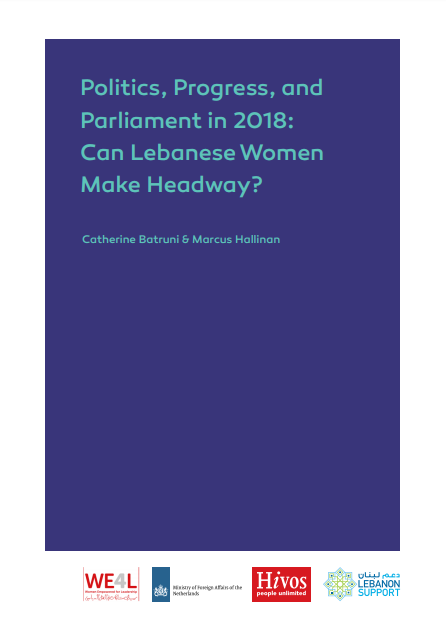
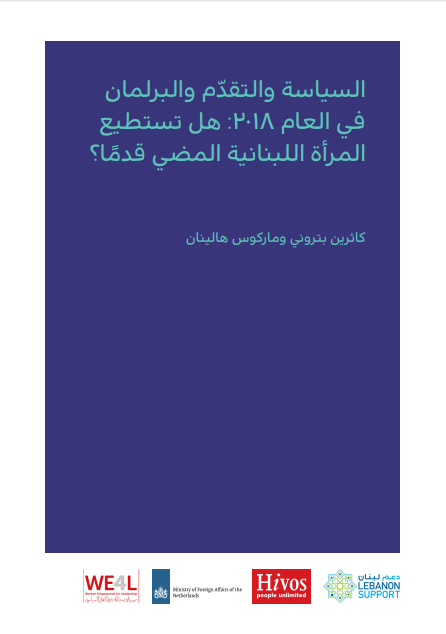
Lebanon may witness a remarkable rise in the number of women serving in Parliament come May 2018 due to initiatives from women’s groups, “civil society” activists, and the substantial number of female candidates – 113 at the start of the election period. However, as this briefing paper shows, Lebanese women continue to face numerous challenges in entering government. The new electoral law passed in June 2017 does not provide women with equal opportunity to be elected, and it is yet to be seen whether it will increase female representation in Parliament. Nevertheless, the historic number of female candidates running in this election demonstrates that women are more determined than ever to increase their presence in Lebanese politics.
This briefing paper is available in English and Arabic, and is available on this link.
It is published in the frame of the call: "New on The Scene, Can Emerging Political Actors and Women Make Headway in Lebanon's 2018 Parliamentary Elections?".
For a thorough discussion of "new" and "civil society actors" participation in Lebanon's 2018 Parliamentary elections, read: Zeina el-Helou, "Lebanon's 2018 Elections: An Opportunity for "New" Political Actors".
قد يشهد لبنان زيادة ملحوظة في عدد النساء اللواتي سيشغلن مقاعد في البرلمان في أيار/ مايو ٢٠١٨ القادم نتيجة مبادرات قدمتها مجموعات نسائية وناشطون في «المجتمع المدني»، وكذلك بسبب العدد الكبير من المرشحات ـ ١١٣ في بداية الفترة الانتخابية. غير أن النساء اللبنانيات لا يزلن يتعرضن لتحديات عديدة للتواجد في الحكومة، مثلما تظهر الورقة الآتية. إذ لا يقدم القانون الانتخابي الجديد الذي أقر في حزيران/ يونيو ٢٠١٧ فرصة متساوية للنساء كي يتم انتخابهن، وسيظهر لاحقا إن كان سيزيد تمثيل النساء في البرلمان فعليا غير أن العدد التاريخي للنساء المرشحات لهذه الانتخابات يبرهن على أن النساء أكثر تصميما من أي وقت مضى على زيادة حضورهن في السياسة اللبنانية.
موجز السياسات هذا متوفر باللغة العربية والانكليزية على هذا الرابط، ومنشور ضمن إطار دعوة: "جديد على المشهد السياسي: هل يستطيع الفاعلون الناشئون والنساء إحراز تقدمٍ في الانتخابات البرلمانية اللبنانية للعام ٢٠١٨ ؟"
للمزيد عن موضوع مشاركة "الفاعلين الجدد" و"فاعلي المجتمع المدني" في الانتخابات البرلمانية اللبنانية للعام ٢٠١٨، اقرؤا "هل الانتخابات اللبنانية للعام ٢٠١٨ فرصة ظهور فاعلين سياسيين «جدد»؟" لزينة الحلو.
A Practical Guide for Civil Society Organisations in Lebanon towards Gender Mainstreaming (En-Ar)
دليل عملي لمنظمات المجتمع المدني في لبنان من أجل تعميم منظور النوع الاجتماعي
By: Lebanon Support
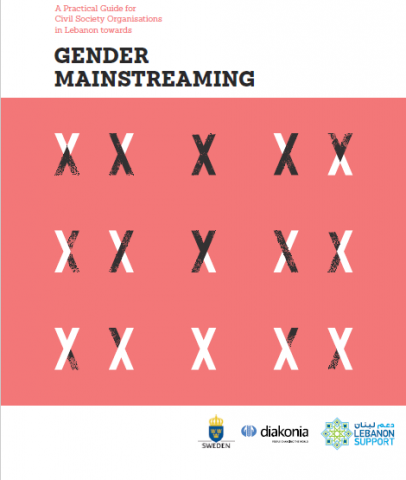
This Gender Manual is a practical guide for civil society organisations in Lebanon that wish to enhance gender equity in their practices and policies. Far from being exhaustive, this manual contains practical guidelines that can help to both gain a better understanding of gender-sensitive topics, as well as to integrate and implement them in internal processes, action plans, and organisational structures and policies. It is informed by the findings of a series of meetings and consultations with various stakeholders engaged in gender issues. It is worth noting, however, that the guidelines provided in these pages are general, and should thus be tailored and incorporated depending on the organisation’s type, specialisation, and focus.
This Gender Manual is developed by Lebanon Support in collaboration with Diakonia, as part of Lebanon Support’s Gender Equity Network, which is part of Lebanon Support’s Civil Society Knowledge Center. The Gender Equity Network (civilsociety-centre.org/gen) aims to enhance local and national capacities’ access to—and development of—knowledge- and evidence-based research, information, and literature on gender issues and concerns. The manual also falls within Lebanon Support’s Civil Society Incubator.
This Gender Manual is available in English and Arabic here.
دليل تعميم منظور النوع الاجتماعي هو دليل عملي لمنظمات المجتمع المدني في لبنان التي تصبو إلى تعزيز المساواة الجندرية في ممارساتها وسياساتها. لا يزعم هذا الدليل بأنه شامل وهو يحتوي على توجيهات يمكنها المساعدة في اكتساب فهم أفضل للمواضيع التي تراعي النوع الاجتماعي، إضافة إلى دمجها وتنفيذها في العمليات الداخلية وخطط العمل والهياكل التنظيمية والسياسات. وهو يستمد المعلومات من نتائج مجموعة من اللقاءات والاستشارات مع مختلف أصحاب/صاحبات المصلحة المنخرطين في قضايا الجندر. لكن من الجدير بالملاحظة أن التوجيهات المقدمة في هذه الصفحات تتسم بالعمومية، وينبغي بالتالي تعديلها ودمجها اعتمادا على نمط المنظمة وتخصصها ومجال تركيزها.
دليل تعميم منظور النوع الاجتماعي متوفر في اللغة الانكليزية والعربية هنا.
2. Newest gender organisations registered on Daleel Madani
الفاعلين المختصّين بالجندر المسجّلين حديثًا على دليل مدني
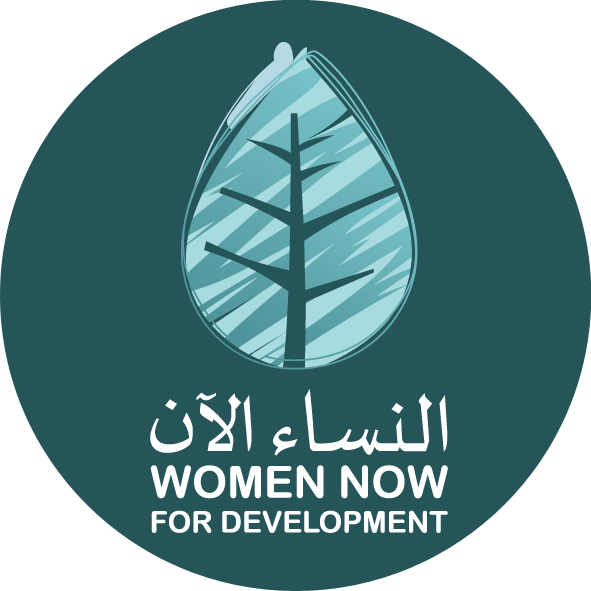
Women Now for Development:
View their profile on Daleel Madani here.
Women Now for Development is a non-profit organisation dedicated to deepening and strengthening women’s role in Syrian and host communities by enhancing their political, social, economic, and cultural participation.
النساء الآن من أجل التنمية
انقر هنا لمشاهدة الصفحة على دليل مدني.
النساء الآن من أجل التنمية هي منظّمة غير ربحية مكرّسة لتعميق وتعزيز دور المرأة في المجتمع السوري والمجتمعات المضيفة عبر تعزيز مشاركتها السياسية والاجتماعية والاقتصادية والثقافية.

The Euromed Feminist Initiative:
View their profile on Daleel Madani here.
Euromed Feminist Initiative (EFI) is a policy network providing expertise in the field of gender equality and its connection with democracy. EFI seeks to correct gender power imbalances through ending discrimination and oppression of women, and bringing about positive change for society as a whole.
المبادرة النسوية الأورومتوسطية:
انقر هنا لمشاهدة الصفحة على دليل مدني.
المبادرة النسوية الأورومتوسطية هي شبكة سياسات تقدّم الخبرة في مجال المساواة الجندرية وارتباطها بالديمقراطية. تسعى المبادرة النسوية الأورومتوسطية إلى تصحيح الخلل في ميزان القوى الجندري عبر إنهاء التفرقة ضدّ النساء وقمعهنّ، وإحداث تغييرٍ إيجابي في المجتمع ككلّ.
3. Events Lebanon Support organised and participated in
النشاطات التي نظمها وشارك فيها مركز دعم لبنان
Round table: New on the Scene: Can Emerging Political Actors and Women make Headway in Lebanon's 2018 Parliamentary Elections?
جديد على المشهد السياسي: هل يستطيع الفاعلون الناشئون والنساء إحراز تقدمٍ في الانتخابات البرلمانية اللبنانية للعام ٢٠١٨ ؟

On April 26, 2018, Lebanon Support hosted a round table on emerging political actors and women’s participation in Lebanon’s 2018 parliamentary elections. The session aimed at discussing the findings of two briefing papers published in the frame of the call “New on the Scene: Can Emerging Political Actors and Women make Headway in Lebanon's 2018 Parliamentary Elections?”. This event is within the “Examining Prospects for Women and New Political Actors in the 2018 Elections” project by Lebanon Support in partnership with HIVOS – Beirut Office, and is part of the Women Empowered for Leadership programme (WE4L).


The discussion, which took place at Smallville Hotel in Badaro, was led by Catherine Batruni, independent researcher, who presented the first briefing paper "Politics, Progress, and Parliament in 2018: Can Lebanese Women Make Headway?" written with Marcus Hallinan, and Zeina el-Helou, an independent researcher and a political activist who discussed the second briefing paper titled "Lebanon's 2018 Elections: An Opportunity for "New" Political Actors". It was moderated by Halim Shebaya, a writer and university instructor at the Lebanese American University.
Check the full summary of this roundtable on our Gender Equity Network, here.
بتاريخ 26 نيسان/ أبريل 2018، نظم مركز دعم لبنان حلقة حوار حول مشاركة الفاعلين السياسيين الناشئين والنساء في الانتخابات البرلمانية اللبنانية للعام 2018. وقد هدفت الجلسة إلى مناقشة نتائج موجزي سياسات نشرا في إطار دعوةٍ بعنوان: "جديد على المشهد السياسي: هل يستطيع الفاعلون السياسيون الناشئون والنساء إحراز تقدّمٍ في الانتخابات البرلمانية للعام 2018؟". يقع هذا الحدث ضمن مشروع "تفحّص الآفاق للنساء والفاعلين السياسيين الجدد في انتخابات 2018" لمركز دعم لبنان بالشراكة مع هيفوس ـ مكتب بيروت، وهو جزءٌ من برنامج تمكين النساء للقيادة (WE4L).
جرى النقاش في فندق سمولفيل في بدارو، وشاركت فيه الباحثة المستقلّة كاترين بتروني التي قدّمت موجز السياسات الأول بعنوان: "السياسة والتقدّم والبرلمان في العام 2018: هل تستطيع المرأة اللبنانية المضيّ قدماً؟" كتب مع ماركوس هالينان، والباحثة المستقلة والناشطة السياسية زينة الحلو التي ناقشت موجز السياسات الثاني بعنوان: "هل الانتخابات اللبنانية للعام 2018 فرصةٌ ظهور فاعلين سياسيين "جدد"؟". أدار حلقة الحوار حليم شبيعة، الكاتب والأستاذ في الجامعة اللبنانية الأمريكية.
اضغط هنا للاطلاع على ملخّصٍ كاملٍ لهذه الجلسة في شبكة العدالة الجندرية الخاصّة بنا.
AUB Gender Conference - “Feminism(S) in Crisis? Gender and the Arab Public Sphere”
مؤتمر الجامعة الأميركية في بيروت عن الجندر - "النسوية في أزمة؟ الجندر والحياة العامّة في المجتمعات العربية"

On January 19-20, The American University of Beirut hosted a two-day conference on “Feminism(s) in Crisis? Gender and the Arab Public Sphere.” Through more than 13 panels and 50 paper presentations, the conference brought together scholars from a wide range of disciplines to discuss themes pertaining to gender in the Arab world, including: gender roles and identities, women’s rights and policy-making, national and transnational feminist movements, feminist organising and community-building, and “the intersections of feminism with labor, LGBT, anti-racist, and anti-sectarian movements.” Lebanon Support’s gender researcher Sarah ElMasry presented a paper on transnational feminism in Lebanon and Egypt, titled “From Beirut to Cairo: Is a model of cross-national feminism possible?” The conference held a variety of presentations, roundtables, and lectures, with keynote speakers such as Dr. Nadje Al-Ali from the School of Oriental and African Studies, Dr. Beth Baron from the City University of New York, and Dr. Hoda ElSadda from Cairo University. It was organised by the AUB Faculty of Arts and Sciences and the Center for Arab and Middle East Studies.
Check more details about this conference here, its full programme and titles of the papers presented, here.
عقدت الجامعة الأمريكية في بيروت يومي 19 و20 كانون الثاني/ يناير، مؤتمراً لمدّة يومين عن: "النسوية في الأزمات؟ الجندر والحياة العامّة في المجتمعات العربية". وعبر تقديم أكثر من 13 جلسة حوارية و50 بحثاً، جمع المؤتمر باحثين من مجال واسعٍ من التخصّصات لمناقشة المواضيع المرتبطة بالنوع الاجتماعي في العالم العربي، بما فيه: الأدوار والهويات الجندرية، حقوق المرأة وصنع السياسات، الحركات النسوية الوطنية والعابرة للقومية، التنظيمات النسوية وبناء المجتمع، و"ملتقى النسوية مع الحركات العمّالية، والحركات المتعلّقة بالمثلية الجنسية والثنائية الجنسية والتحول الجنسي (LGBT) وحركات مناهضة العنصرية والطائفية". وقد قدّمت الباحثة في مجال الجندر في مركز دعم لبنان، سارة المصري، بحثاً حول النسوية العابرة للقومية في لبنان ومصر، بعنوان: "من بيروت إلى القاهرة: هل وجود نموذجٍ للنسوية العابرة للقومية ممكن؟" تضمّن المؤتمر عدداً كبيراً من العروض والحلقات البحثية والمحاضرات، وشارك فيه متحدّثون بارزون كالدكتورة نادية العلي من كلية الدراسات الشرقية والأفريقية، والدكتورة بيث بارون من جامعة مدينة نيويورك والدكتورة هدى الصدّة من جامعة القاهرة. كان المؤتمر من تنظيم كلّية الفنون والعلوم في الجامعة الأمريكية ببيروت ومركز الدراسات العربية والشرق أوسطية.
اضغط هنا من أجل مزيدٍ من المعلومات حول هذا المؤتمر، واضغط هنا للحصول على برنامجه الكامل وعناوين البحوث التي قُدّمت فيه.
LADE’s Roundtable on Women’s Political Participation in Lebanon
حلقة حوار حول المشاركة السياسية للمرأة في لبنان من تنظيم الجمعية اللبنانية من أجل ديمقراطية الانتخابات

The Lebanese Association for Democratic Elections (LADE) hosted a roundtable on February 12 in the run-up to the Lebanese parliamentary elections. The roundtable invited women from Lebanese political parties to discuss the upcoming elections, prospects of their participation, and coalition-building processes. Lebanon Support, as well as other civil society organisations concerned with gender equality and women’s rights, participated to the discussion and engaged with women party members about the challenges they face in the upcoming elections.
Check a summary of the roundtable in Arabic on LADE’s website, here.
استضافت الجمعية اللبنانية من أجل ديمقراطية الانتخابات حلقة حوار بتاريخ 12 شباط/ فبراير في خضمّ السباق على المقاعد البرلمانية. دعت حلقة الحوار نساءً من الأحزاب السياسية اللبنانية لمناقشة الانتخابات القادمة وآفاق مشاركتهنّ وعمليات بناء التحالفات بينهنّ. وقد شارك في النقاش مركز دعم لبنان، إلى جانب منظّمات مجتمعٍ مدنيٍّ أخرى مهتمّة بالمساواة الجندرية وحقوق المرأة، تم التحدث فيه مع عضوات تلك الأحزاب حول التحدّيات التي يواجهنها في الانتخابات القادمة.
اضغط هنا لمراجعة ملخّصٍ عن حلقة الحوار هذه باللغة العربية على موقع الجمعية اللبنانية من أجل ديمقراطية الانتخابات.
4. FOCUS ON - أضواء على
Women in Lebanon’s Parliamentary Elections of May 2018
النساء في الانتخابات البرلمانية اللبنانية التي أجريت في أيار/ مايو 2018
The 2018 Lebanese parliamentary elections took place on May 6. A total of 976 candidates were registered to run for the elections, and 113 of them were women. However, due to the conditions of the new proportional electoral system, candidates were required to join electoral lists. Those who could not, were automatically disqualified. As such, 511 men and 86 women effectively ran for elections, with 41% of men and 24% of women withdrawing by the deadline for registering electoral lists. The new law, thus, denied 1/4 of women candidates the opportunity to continue their candidacy, manifesting how it does not facilitate access to Parliament for women in particular.
The figure below shows the distribution of the 2018 Lebanese parliamentary candidates by gender, before and after electoral list deadline.

Despite the significant increase in women’s candidacy in comparison to the 2009 elections – when 12 women ran – 36.4% of electoral lists had no women candidates. Still, a majority of registered lists in the recent elections, had at least one woman candidate (62.3%), whereas Nisā’ Akkar was the only electoral list to be entirely composed of women. While religious quotas for sects in Parliament are used, Lebanon has still not instituted a gender quota in spite of campaigning by women’s groups. Had a gender quota been adopted, it might have encouraged more women to form women-only electoral lists, and enhanced equality of opportunity for women.
The figure below shows the distribution of female candidates across 77 electoral lists.

Eventually, six women were elected into the Lebanese Parliament. Four of them are new comers in the Parliament, Paula Yacoubian, Rola Tabsh Jaroudi, Inaya Ezzeddine, and Dima Jamali, whereas Bahia Hariri and Strida Geagea are serving for a new term.
The figures above are part of Lebanon Support’s briefing paper “Politics, Progress, and Parliament in 2018: Can Lebanese Women Make Headway?”
For a thorough description and analysis of women’s candidacy in the elections, read our briefing paper, available in English and Arabic.
أجريت الانتخابات البرلمانية اللبنانية للعام 2018 في السادس من أيار/ مايو. وقد سُجّل ما مجموعه 976 مرشحاً للتنافس في الانتخابات، 113 منهم من النساء. لكن بسبب شروط القانون الانتخابي النسبي الجديد، أُلزم المرشحون/ات الانضمام إلى لوائح انتخابية. وهكذا فقد جميع من لم يتمكّنوا من الانضمام إلى لائحة الأهلية للترشح بصورةٍ آلية. بالتالي، لم يتجاوز العدد الفعلي لمن استمر في الترشح 511 رجلاً و86 امرأة، وبلغت نسبة المنسحبين من الرجال 41 بالمئة ومن النساء 24 بالمئة لدى حلول الموعد النهائي لتسجيل اللوائح الانتخابية. على هذا النحو، أنكر القانون الجديد على ربع النساء المرشّحات فرصة مواصلة ترشيحهن، حيث أظهر هذا القانون أنّه لا يسهّل الوصول إلى البرلمان على النساء بخاصّة.
يظهِر الشكل أدناه توزيع المرشّحين إلى برلمان العام 2018 حسب النوع الاجتماعي، قبل الموعد النهائي لتقديم اللوائح الانتخابية وبعده.

على الرغم من الزيادة الملموسة في ترشيح النساء بالمقارنة مع انتخابات العام 2009 ـ عندما ترشّحت 12 امرأة ـ فقد خلى 36,4 بالمئة من اللوائح من النساء المرشّحات. غير أنّ غالبية اللوائح المسجّلة في الانتخابات الماضية احتوت على مرشّحة واحدة على الأقلّ (62,3 بالمئة) في حين أنّ قائمة نساء عكّار كانت اللائحة الانتخابية الوحيدة المكوّنة بأكملها من النساء. وفي حين تُستخدَم حصص الطوائف الدينية في البرلمان، لم يقرّ في لبنان بعد حصّةً جندريةً، على الرغم من الحملات التي أطلقتها مجموعات نسائية لهذا الغرض. ولو أنّ الحصص الجندرية استُخدمت، فلربّما شجّعت مزيداً من النساء على تشكيل لوائح انتخابية مؤلفة من النساء فقط، ولعزّزت المساواة في الفرص بين النساء والرجال.
يُظهر الرسم البياني أدناه توزّع المرشّحات في 77 لائحة انتخابية.

في نهاية المطاف، انتُخبت ستّ نساءٍ في البرلمان اللبناني. أربعٌ من أولئك النساء حديثات عهدٍ في البرلمان، وهنّ بولا يعقوبيان، رولا طبش جارودي، عناية عز الدين، وديما جمالي، في حين انتُخبت كلٌّ من بهيّة الحريري وستريدا جعجع لدورةٍ جديدة.
الرسوم البيانية أعلاه جزءٌ من موجز السياسات التي نشره مركزا دعم لبنان بعنوان: "السياسة والتقدّم والبرلمان في العام 2018: هل تستطيع المرأة اللبنانية المضيّ قدّماً؟"
من أجل وصفٍ وتحليلٍ شاملين لترشّح النساء في الانتخابات، اقرؤا موجز السياسات التي نشرناها، وهي متاحة باللغة الإنكليزية والعربية.
Selected civil society campaigns and activities on women’s political participation
حملات ونشاطات المجتمع المدني المختارة حول المشاركة السياسية النسائية
In the run-up to and after the Lebanese parliamentary elections, many local and international civil society organisations launched campaigns aimed at raising awareness about women’s participation in the elections and in public office, as well as the challenges they face.
Below is a selection of some of these initiatives:
في سياق السبق الانتخابي البرلماني اللبناني وبعده، أطلق كثيرٌ من منظّمات المجتمع المدني المحلية والدولية حملاتٍ تهدف إلى زيادة الوعي بمشاركة النساء في الانتخابات والمناصب الحكومية، وكذلك بالتحدّيات التي يواجهنها.
في ما يلي بعض هذه المبادرات:

- During the election season, Maharatnews, an independent participatory youth news website, monitored the media coverage of the electoral campaigns of women candidates, and produced an awareness video about how to address and profile women candidates without perpetuating gender stereotypes.
- أثناء موسم الانتخابات، أشرف موقع مهارات نيوز، وهو موقع إلكتروني إخباري شبابي تشاركي مستقل، على التغطية الإعلامية للحملات الانتخابية للمرشّحات، وأنتج فيديو لزيادة الوعي حول كيفية توجيه ورسم صورة المرشّحات من دون إدامة الأشكال الجندرية النمطية.

- In order to help bridge the gap in female political representation and ahead of the Lebanese parliamentary elections, Search for Common Ground (Search), in partnership with ABAAD, implemented the “Qalb El-Soura” project- funded by the British Embassy in Lebanon. The title is a play-on-words in Arabic meaning “Qalb” as in “change” the perspective on women in politics and “inside the frame of” a photo since the project utilises media as a primary tool for promoting women’s involvement in politics.
- بهدف المساعدة في ردم الهوّة في التمثيل السياسي النسائي وقبيل الانتخابات النيابية اللبنانية، نفّذت منظّمة البحث عن أرضية مشتركة (البحث)، بالشراكة مع أبعاد، مشروع "قلب الصورة" الممول من السفارة البريطانية في لبنان. يلعب عنوان المشروع على معنى كلمة "قلب" العربية حيث تعني "التغيير" في النظرة إلى النساء في السياسة و"داخل إطار" صورةٍ حيث يستخدم المشروع وسائل الإعلام كأداةٍ رئيسيةٍ في الترويج لانخراط النساء في السياسة.
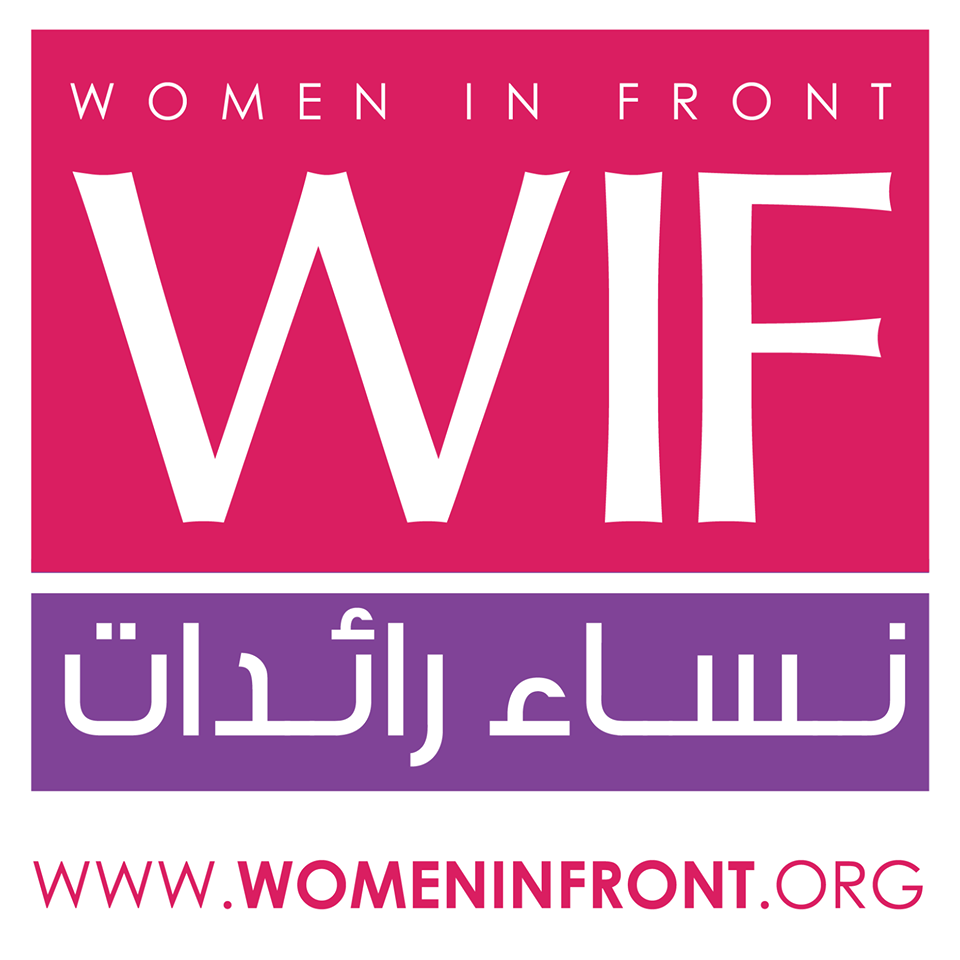
- Coinciding with the discussions concerning the formation of the Lebanese cabinet, Women in Front, a local NGO, launched a media campaign “#HowManyWomenMinistersWillYouNominate.” The campaign is based on a series of short videos featuring journalists and TV anchors who address leaders of political parties and coalitions about the number of women ministers they intend to nominate for government.
- بالتزامن مع النقاشات المتعلّقة بتشكيل الوزارة اللبنانية، أطلقت منظمة نساء رائدات، وهي منظمة غير حكومية محلية، حملةً إعلاميةً بعنوان: "#كم_وزيرة_رح_تعيّنوا". تستند الحملة على سلسلة من الفيديوهات القصيرة التي يظهر فيها صحافيون ومعلّقون تلفزيونيون يتوجّهون إلى زعماء الأحزاب والتحالفات السياسية بصدد عدد الوزيرات التي ينوون تسميتهنّ في الحكومة.
5. Gender news
From Lebanon
- On March 8, thousands of women and men marched in Beirut against gender based violence, and discrimination of all kinds, raising the slogan, “Different Causes, Shared Anger.” The march came to mark International Women’s Day.
- On May 16, the organiser of the Beirut Pride Hadi Damien reported that he was detained overnight by Lebanese authorities. Damien was arrested during a public reading of theater play, questioned at a police station, and was released only after signing a pledge to acknowledge the decision by the General Prosecutor of Beirut to cancel the Beirut Pride’s events which started on May 12 and were supposed to last until May 20.
- By the end of May, campaigns were launched upon the issuance of a presidential decree that granted the Lebanese nationality to 375 individuals, including a number of foreign businessmen and politicians. This evoked reactions, on social media platforms particularly from Lebanese women who are still unable to pass the Lebanese nationality to their children.
- The Public Prosecutor's Office demanded the security forces to grab a child barely nine years old from his mother, after the Sunni religious court violated its law and gave custody to the father, who accumulated a large sum of his son's maintenance. The father had beaten the mother and was exposed to an warrant for arrest from the execution department for not being committed to pay maintenance, but soon a decision was issued to drop custody. This way, the obligation of alimony was suspended.
أخبار من لبنان
- بتاريخ 8 آذار/ مارس، شارك آلاف النساء والرجال في مسيرةٍ ببيروت احتجاجاً على العنف المستند إلى النوع الاجتماعي والتفرقة بكافّة أشكالها، رافعين شعار "قضايانا متعددة، غضبنا واحد". أتت المسيرة في ذكرى إحياء يوم المرأة العالمي.
- بتاريخ 16 أيار/ مايو، ذكر منظّم مسيرة الفخر في بيروت هادي داميان بأنّ السلطات اللبنانية احتجزته طيلة الليل. اعتُقل داميان أثناء قراءة مسرحية للعامة، واستُجوب في مخفر شرطة، ولم يتم إطلاق سراحه إلا بعد توقيعه على تعهّدٍ بالاعتراف بقرار المدّعي العام في بيروت والقاضي بإلغاء مناسبات فخر بيروت التي بدأت بتاريخ 12 أيار/ مايو وتمّ تعليقها حتّى 20 أيار/ مايو.
- في أواخر أيار/ مايو، شُنت حملاتٌ بعد صدور مرسومٍ رئاسيٍّ ينصّ على منح الجنسية اللبنانية لثلاثمئة وخمسة وسبعين شخصاً، بمن فيهم عددٌ من رجال الاعمال والسياسيين الأجانب. أثار هذا المرسوم ردود أفعال، ولاسيّما على منصّات التواصل الاجتماعي، من نساءٍ لبنانيات لا يزلن غير قادراتٍ على منح الجنسية اللبنانية لأبنائهن.
- قامت النيابة العامة بالطلب من القوى الأمنية انتزاع ولد لم يتخطى عمره 9 سنوات من أمه، بعد أن خالفت المحكمة الشرعية السنّية قانونها وأعطت الحضانة للأب الذي تراكم عليه مبلغ كبير من نفقة ابنه. وكان الأب قد تعرض بالضرب للأم وكاد أن يصدر بحقه قرار حبس من دائرة التنفيذ لعدم التزامه بدفع النفقة، لكن سرعان ما تم اصدار قرار إسقاط الحضانة ليقف معها موجب النفقة.
Around the world
- Over the months of May and June, and in a wave of crackdown deemed unprecedented, Saudi authorities arrested a dozen activists, most of whom were prominent women’s rights advocates, just a few weeks before the country lifts its ban on women driving.
- In a historic move in May, Pakistan’s parliament issued a law that grants transgender citizens the freedom to express their gender identity, and protects them notably against discrimination by employers and private business owners.
- In May, the Republic of Ireland voted overwhelmingly to overturn the abortion ban in a referendum. This comes three years after Ireland has voted to legalise same sex marriage.
- On June 7, Spain witnessed its first female majority cabinet. Out of 17 posts in the new cabinet, women held 11 key positions. This historical achievement comes after women’s ongoing mobilisation in Spain that culminated in a 24-hour strike against “sexual discrimination and gender inequality” on March 8.
أخبار من حول العالم
- على مدى شهري أيار/ مايو وحزيران/ يونيو، وفي حملة بطشٍ عُدّت غير مسبوقة، أوقفت السلطات السعودية حوالي اثنتي عشرة ناشطة، معظمهنّ من المدافعات البارزات عن حقوق المرأة، قبل بضعة أسابيع من إلغاء القانون الذي يمنعَ النساء من قيادة السيارات.
- في شهر أيار/ مايو وفي خطوةٍ تاريخية، أصدر البرلمان الباكستاني قانوناً يمنح المواطنين من ذوي الهوية الجنسية العابرة للجندر حرّية التعبير عن هويّتهم الجندرية ويحميهم بخاصّةٍ من تفرقة التي قد تنتج عن المشغّلين وأرباب العمل ضدّهم.
- في أيّار/ مايو، أجري استفتاءٌ في جمهورية إيرلندا من أجل إلغاء منع الإجهاض، ففاز الاقتراح بأغلبيةٍ كبيرة. ويأتي هذا التصويت بعد ثلاث سنوات من التصويت على السماح بزواج المثليين.
- في السابع من حزيران/ يونيو، شهدت إسبانيا أوّل وزارةٍ تمثّل النساء أغلبيتها. فمن أصل 17 منصباً في الوزارة الجديدة، احتلّت النساء 11 منصباً أساسياً. ويأتي هذا الإنجاز التاريخي بعد التعبئة المتواصلة للنساء في إسبانيا والتي بلغت ذروتها في إضرابٍ لمدّة 24 ساعة ضدّ "التفرقة الجنسية وعدم المساواة بين الجنسين"، وذلك في الثامن من آذار/ مارس.

